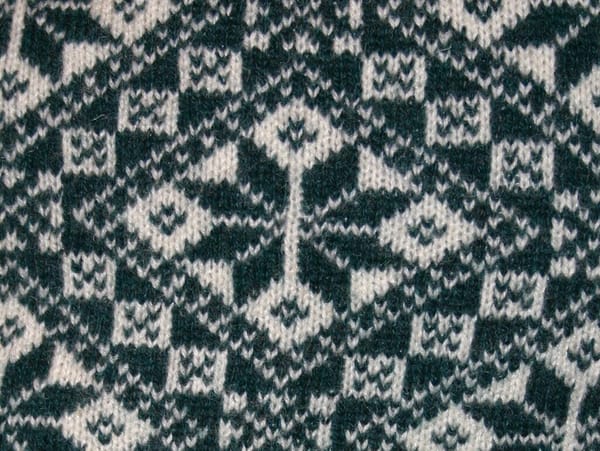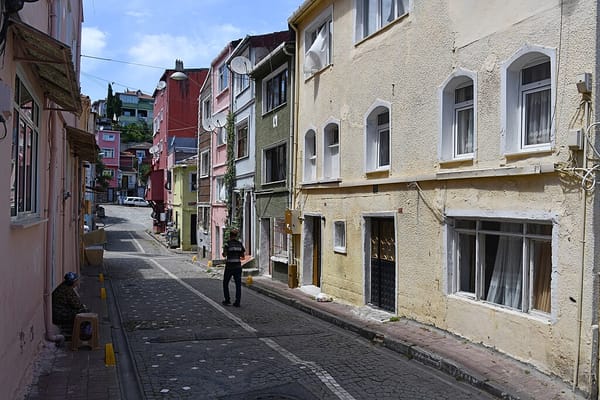Comb Sisters & Seclusion
Unwed women in China's Canton Delta found autonomy and sisterhood in communal homes. Also, what can architecture teach us about gender?

Featured Articles
Comb Sisters
Places Journal • 26 Nov 2024 • ~7000 words
Unwed women in China's Canton Delta found autonomy and sisterhood in gupouks, communal homes that emerged in tandem with the industrialization of silk-making.
“Combing Up” or “Self-Combing” represented the initiation of a Comb Sister: an unmarried, celibate, economically sufficient woman who lived communally with other women. Becoming a Comb Sister was a young woman’s only alternative to arranged marriage, though it was also a potent gesture of defiance, self-determination, and female solidarity. 2 Comb Sisters referred to themselves as a “sisterhood,” a word rarely used in rural Canton, and in this case uniquely apt. Comb Sisters assumed the role of family and community in each other’s lives.
What Can Architecture Teach Us About Gender?
The Great Gender Divergence • 27 Nov 2024 • ~5900 words
Alice Evans explores how cultural evolution can be traced through architecture, particularly around gender roles and female seclusion practices.
In societies where male honour depended on female seclusion, this was preserved through design. Today, I explore how architecture reveals the spread of purdah (female seclusion). Across North India, the Delhi Sultanate and Mughal Emperors built palaces with extensive women’s quarters (zenanas). Hindu nobles likewise added screened galleries and walled courtyards. Emulation secured patronage and prestige. The caste system provided a powerful vehicle for transmitting upper-caste customs nationwide, as entire jatis copied upper castes to gain status and social inclusion. But where Islamic influence was weaker, seclusion was not idealised - as shown by architecture, paintings, and contemporary urban female labour force participation.
Recommended Articles (7 Articles Today)
Prison And Crime: Much More Than You Wanted To Know
Astral Codex Ten • 27 Nov 2024 • ~13050 words
Scott Alexander dives into studies on incarceration and tries to find an answer to the question of whether longer prison sentences reduce crime or not.
Imagine a country which currently incarcerates zero people, trying to decide whether to move up to a policy of incarcerating one person. If you only incarcerate one person, it will be the baddest dude in the whole country. That guy really needs to be behind bars! And we’re not worried about turning him into a hardened criminal, because he’s already maximally bad. Here it’s obvious that benefits outweigh costs. Now imagine a country which incarcerates 50% of its population, trying to decide whether to move up to 50% + 1. At this point, you’re imprisoning someone who went a few miles over the speed limit. You gain no benefits from incapacitation (he wasn’t going to commit any crimes anyway), but you stand to lose a lot from aftereffects (he’s probably a totally normal law-abiding citizen, so there’s a very high risk of ruining his life and turning him into a more hardened criminal). Here it’s obvious that costs outweigh benefits.
Gisele Pelicot: Finding Sisterhood at France’s Mass Rape Trial
New Lines Magazine • 27 Nov 2024 • ~3200 words
An Avignon courthouse has become a site of pilgrimage for French women seeking catharsis and community.
What is most extraordinary about this trial is Gisele Pelicot herself: her decision to waive anonymity and demand that the proceedings — including the video evidence of her own rapes — be made public. The woman holding my hand knows this — and so do the 60 or so others who came into the room with us. They know the toll this selfless decision has had on the 71-year-old. This is why hundreds of them line up at 7 a.m. every morning outside the courthouse, hoping to secure a seat in the cramped public viewing room or to simply clap and cheer and hand out bouquets to Gisele as she crosses the lobby. Day in and day out, women bear witness to her sacrifice, their presence a quiet but powerful rebellion against the shame and silence that have long cloaked sexual violence in France and across the world.
How the 1980s Engineered the Collapse of the Working Class
The Walrus • 27 Nov 2024 • ~3100 words • Archive Link
Forty years later, policies to prop up the super rich are still going strong.
You can name all the people who personified the excess or the austerity of the 1980s—Ronald Reagan, Margaret Thatcher, Madonna—but it was Friedman who defined the era. On January 1, 1980, he and his wife, Rose Friedman, released a provocative manifesto called Free to Choose: A Personal Statement. A little more than a week later, he followed it up with the launch of a syndicated weekly television series extolling his simple message: government is bad; capitalism is good. Get government out of the way and the natural order of the universe will be restored by the magical “invisible hand” of the market. It was a form of economic fundamentalism based on the pseudo-scientific claim that an economy driven solely by greed and those with the most money is the natural order.
The Secret Sex Lives of Deep, Dark Corals
Hakai Magazine • 27 Nov 2024 • ~4450 words
A unique fjord in Chilean Patagonia gives scientists a chance to unlock the reproductive secrets of cold-water corals that typically live thousands of meters below the ocean’s surface.
They may lack brains, but each individual coral seems to have a mind of its own, and after weeks the team has gotten used to the corals’ distinct personalities. Some tolerate the light of a flashlight or the slam of a door; others curl their tentacles at the slightest disturbance, preferring privacy—they’ll only do it with the lights off. The researchers running this show have their patience tested coaxing the coral contestants to cooperate. “They all do their own thing,” says Waller. “If they’re happy, they’ll spawn well; if they’re unhappy, then they just close up.”
He Was One of New York’s Busiest Shoplifters. His Mother Was a Cop.
New York Times • 26 Nov 2024 • ~3350 words • Archive Link
Drug addiction fueled David Andino’s need to steal. Every day, he hit the same Target in Manhattan. His mother, a retired police officer, hadn’t seen him in years.
He popped through the sliding front door, where a security guard stood posted. No sense trying to sneak in — the guards all knew him on sight. In his head, a timer was ticking, like a shot clock. Ninety seconds. That was how long it would take for the police to respond to the 911 call the security guard would be making right now.
A grief with no name
Aeon • 26 Nov 2024 • ~3500 words
As a child, I was torn from a culture that I never knew. It is a loss that defines me, even as I struggle to define the loss.
In cultural grief, as in radical hope, a person is directed emotionally to something that they can’t fully grasp. I grieve losses related to migrating, to my culture, to my family. Yet my emotions themselves do not open out onto those specific losses, as a window looks out onto a street. In grief, a loss takes shape against my present life, especially in terms of what I care about, what defines me and what is important to me. As these elements are in constant formation, I don’t quite know the significance of the loss. And yet still I grieve, knowing it is significant.
A Man of Parts and Learning
London Review of Books • 14 Nov 2024 • ~8200 words
Fara Dabhoiwala on the portrait of Francis Williams.
The dealer, Jack Spink . . . recognises it as an unusual object, with excellent ‘associative’ value, and is sure it will make a quick sale for a good price, probably in America. They like this kind of thing over there. He has some leaflets printed and takes out a full-page advert in Country Life. At the top is a photograph of the painting, and beneath it a lengthy extract from Long’s chapter about Francis Williams – the first two and a half pages of it, no less, in tiny but legible print. That’s the only description provided. To the Howard family, and to Spink, Long’s words explain this picture. It’s an understandable presumption, since pretty much all that is known about Francis Williams comes from Long’s ten-page chapter about him. It remains the only detailed contemporary account of his life, and it was written by someone who had known him. The problem is that Long was, in fact, Williams’s greatest enemy. His potted biography was a malicious hatchet job, full of lies and half-truths, that sought to bury rather than to commemorate its subject. Long’s huge, three-volume History of Jamaica wasn’t really a ‘history’ at all. Angrily composed in the aftermath of the Somerset ruling of 1772, which had undermined the certainty of slaveholding in England, it was above all a defence of West Indian slavery as ‘inevitably necessary’ and an attempt to prove that all ‘black’ people were naturally inferior to the ‘white race’.*




